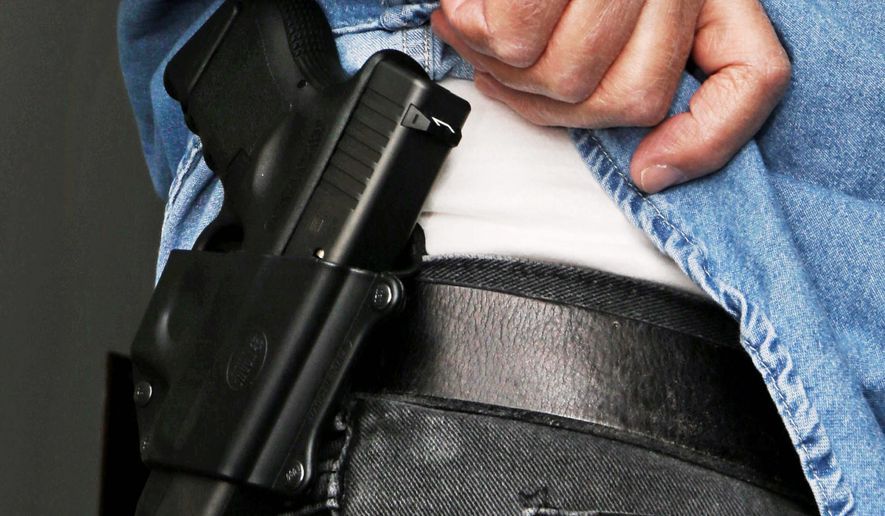More than 16.3 million American residents now hold concealed weapons permits, according to a new report that says even as gun purchases are leveling off, the rate of folks applying for permission to carry their firearms is still rising.
Some 1.83 million new permits were issued in 2016, setting a new record for the fourth straight year, according to the Crime Prevention Research Center. The total number has jumped more than 250 percent from the 4.6 million permits just a decade ago.
States that keep monthly figures said 2017 is continuing the trend, up 3 percent over 2016.
The surge in permits comes even as gun purchases have dropped, on a year-to-year basis, so far under Mr. Trump.
John R. Lott Jr., the researcher who led the report, said that while gun sales were sparked in part by fears of stricter sales controls, those getting permits are motivated by a desire to make sure they can protect themselves outside their homes.
That’s been particularly pronounced among women and minorities.
“It’s pretty much the most vulnerable people in our society who benefit the most from having the option to be able to go and protect themselves,” he said.
Five states that broke the data down by race — Arizona, Connecticut, North Carolina, Oklahoma, and Texas — found that permits for blacks increased 30 percent faster than for whites between 2012 and 2016.
Mr. Lott also said mass shootings have pushed Americans to look into permits. Online searches for “concealed carry” surged following last June’s terrorist attack that killed 49 people at a gay nightclub in Orlando, Florida, the new report said.
After the attack, the number of permits in Florida increased from 1.58 million on June 30, 2016, to 1.68 million at the end of November and now to nearly 1.8 million — the biggest total for any state.
All sides in the gun debate are watching indicators to see what will happen now that President Obama is out of office.
He oversaw a massive increase in gun purchases, as analysts said buyers flocked to shops to stock up ahead of what they feared would be new controls. While some states did pass tight new laws, and Mr. Obama tightened some ownership checks at the federal level, Congress did not approve any broad gun-control bills.
Still, with Mr. Trump in office, sales appear to have cooled.
Mr. Lott said past sales, driven by fear of stricter controls, were often of heavily specialized firearms like the AR-15 semiautomatic rifle.
Those guns would be more suited for hunters or expert hobbyists — not necessarily people newly drawn to firearms for self-protection who would be less likely to stock up on multiple weapons.
Courts have also helped concealed-carry, overturning state and local laws that put severe limits on who could obtain a permit. The most recent strike came in the federal appeals court in Washington, D.C., which overturned the capital city’s strict law requiring residents to prove they had “good reason” to obtain a permit.
City police were granted less than 25 percent of requests.
Philip Van Cleave, president of the Virginia Citizens Defense League, said Americans are increasingly interested in taking responsibility for their own protection. He pointed to reports of high murder rates in cities such as Chicago as a reason.
“More and more people are waking up to the fact that they need to be able to protect themselves,” he said.
Alan Gottlieb, chairman of the Citizens Committee for the Right to Keep and Bear Arms, said the report also comes at a critical moment, as Congress is weighing national reciprocity legislation that would recognize most state-issued permits anywhere else in the country.
But control groups have vowed to fight national concealed carry legislation, saying it would undermine states’ rights to pass their own gun laws.
“‘Concealed carry reciprocity’ would create chaos for law enforcement and put police in danger for doing their jobs,” John Feinblatt, president of Everytown for Gun Safety, said last month.
• David Sherfinski can be reached at dsherfinski@washingtontimes.com.




Please read our comment policy before commenting.